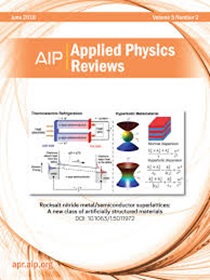精密传感中的弱值与测量
IF 11.6
1区 物理与天体物理
Q1 PHYSICS, APPLIED
引用次数: 0
摘要
弱测量是指对系统干扰很小的一种量子测量。在弱测量的框架下,Aharonov、Albert和Vaidman引入了后选择的概念,从而定义了弱值。近年来,弱值测量(WVM)为研究量子力学中的复杂问题提供了一个新的视角,导致了许多概念上的突破。更重要的是,在实践中,WVM对精度传感的影响是前所未有的。本文首先介绍了基于量子参数估计的WVM的基本理论,并由此推导出弱值放大和弱耦合放大的效应。这两种效应可以显著提高基于WVM的各种传感方案的精度。指出了在相同的测量条件下,WVM方案优于传统方案的技术优势。特别是强调了信息压缩的能力,这在量子计量领域越来越受到关注。这篇综述旨在展示WVM在解决更关键问题方面的应用,以及利用其优势完成目前无法完成的任务的可能性,从而使WVM在未来的精确传感中发挥更重要的作用。本文章由计算机程序翻译,如有差异,请以英文原文为准。
Weak value and measurement in precision sensing
Weak measurement refers to a type of quantum measurement that disturbs the system very little. In the framework of weak measurement, Aharonov, Albert, and Vaidman introduced the concept of postselection and thereby defined the weak value. In recent research, weak-value measurement (WVM) has offered a novel perspective for studying intricate problems in quantum mechanics, leading to many conceptual breakthroughs. More importantly in practice, WVM has shown an unprecedented impact on precision sensing. In this review, we begin by presenting the fundamental theory of WVM based on quantum parameter estimation, from which the effects of weak-value amplification and weak-coupling amplification can be derived. The two effects can significantly improve the precision in various sensing schemes based on WVM. We point out the technical advantages that enable the WVM schemes to outperform the conventional ones under the same measurement conditions. Notably, the capability of information compression is underscored, which is garnering increasing attention in the field of quantum metrology. This review aims to show the possibility for broadening the application of WVM to address more critical problems, and on the other hand, for leveraging its advantages to accomplish tasks that are currently unattainable, such that WVM could play a more important role in the future of precision sensing.
求助全文
通过发布文献求助,成功后即可免费获取论文全文。
去求助
来源期刊

Applied physics reviews
PHYSICS, APPLIED-
CiteScore
22.50
自引率
2.00%
发文量
113
审稿时长
2 months
期刊介绍:
Applied Physics Reviews (APR) is a journal featuring articles on critical topics in experimental or theoretical research in applied physics and applications of physics to other scientific and engineering branches. The publication includes two main types of articles:
Original Research: These articles report on high-quality, novel research studies that are of significant interest to the applied physics community.
Reviews: Review articles in APR can either be authoritative and comprehensive assessments of established areas of applied physics or short, timely reviews of recent advances in established fields or emerging areas of applied physics.
 求助内容:
求助内容: 应助结果提醒方式:
应助结果提醒方式:


